
5 Strategies for Success When Teaching Online
- Subject:
- Educational Technology
- Higher Education
- Material Type:
- Teaching/Learning Strategy
- Author:
- Jacob Spradlin
- Date Added:
- 09/28/2023

5 Strategies for Success When Teaching Online

Activity Sheet: This document provides an overview of how online education helps remove common barriers to accessing education, such as geographical restrictions, disabilities, scheduling conflicts, social stigma, and financial constraints. It uses simple icons and explanations to illustrate how the flexibility and accessibility of online learning platforms can expand educational opportunities to a broader range of students. This would be a useful resource for those exploring online education options, comparing modalities, or looking to increase enrollment through distance learning programs.
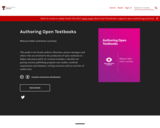
"This guide is for faculty authors, librarians, project managers and others who are involved in the production of open textbooks in higher education and K-12. It includes a checklist for getting started, publishing program case studies, textbook organization and elements, writing resources and an overview of useful tools.

The attached file is a course schedule or outline template in a Word document. It contains a table with columns for week, dates, topic, and activities/assignments. The table has rows for each week of a 15 week course, with dates, topics, and placeholder activities and assignments filled in.

This customizable Excel template provides a master framework to plan and organize learning activities for online courses. The template contains sheets to outline course modules, schedule weekly learning objectives and activities, plan assessments and assignments, and track student progress. Columns are provided to capture activity details like name, type, description, duration, assignments, and more. The template is fully editable so course designers can add or remove sheets as needed to match their planning process. By providing a structured planning template, this Excel file aims to help streamline the instructional design process for online learning. Use it to map out engaging and effective learning experiences for modern online courses.

Presentation of ethnographic research on AI in higher education and future jobs.

Introducing "Navigating the Digital Shift: An Introductory Guide to Online Teaching," a comprehensive mini eBook meticulously designed to facilitate professors in transitioning seamlessly to online or digital instruction. This invaluable resource serves as a beacon for educators venturing into the realms of virtual teaching, providing concise, practical insights coupled with actionable tools to navigate the digital education landscape effectively. Within its pages, professors will uncover a plethora of practical tables, user-friendly templates, and detailed checklists, each crafted to demystify the online teaching process and ensure a smooth transition. Whether you're a seasoned educator or a newcomer to the teaching profession, this guide offers tailored solutions, best practices, and innovative strategies to set up every new online instructor for unparalleled success. Dive into the world of online instruction with confidence, equipped with the knowledge and tools necessary to create engaging, inclusive, and effective learning experiences in the virtual classroom.

The attached file serves as an exemplary template for structuring an online course into modules over a 15-week semester. The outline demonstrates effective course design principles including:- Organizing content into manageable weekly modules - Incorporating diverse learning materials - Building in recurring assignments- Scaffolding assignments to develop skills over time- Aligning objectives, activities and assessments following Bloom's taxonomy for higher order critical thinking.- Providing a clear learning arc through the sequence of modules and summative comparative assignment.

Community engagement and a sense of belonging are pivotal elements in the realm of digital instruction, serving as the bedrock for enriched learning experiences and fostering a conducive learning environment. When learners feel integrated into a community, it acts as a catalyst, enhancing motivation, encouraging persistence, and providing a buffer against the isolation often associated with digital learning platforms. To facilitate the creation and nurturing of online communities and engagement, a meticulously crafted checklist is provided, offering practical tasks and steps. This checklist serves as a beacon, guiding educators and learners through the multifaceted process of building community engagement and fostering a sense of belonging.
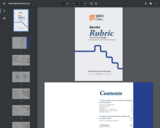
The SHSU Online Course Design Rubric is used to guide and inform the course development process, as well as evaluate the design of any course which contains online components. It can be used whether the course is fully or partially online, flipped or web‐assisted face‐to‐face.
The Rubric was developed by a team of instructional designers and course development practitioners based on nationally recognized, research‐based quality assurance standards related to the essential components of online course design. This includes...
- General course information
- Presentation of course content
- Collaboration & Communication
- Assessment Strategies
- Course Technology
- Learner Support, and
- Accessibility
Not only is the rubric the primary instrument utilized at SHSU for the development and evaluation of online courses, but the tool can also be used as a self‐assessment instrument by instructors as a means to receive constructive feedback on the design of a course, and a means to identify and document effective online course design.
The SHSU Online Course Design Rubric has also been vetted by faculty who are actively involved in online teaching for SHSU. Use of the rubric to inform the development of distance education courses leads to multiple benefits, including...
- Improved student learning
- Ease of navigation of the course environments
- Reduced ambiguity for faculty and students
- More appropriate use of technology
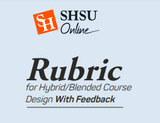
The Rubric for Hybrid/Blended Course Design with FEEDBACK is a fillable tool that can be used to evaluate the integration of pedagogy in a fully online course. This tool is a compliment to the SHSU Online Course Design Rubric, also located as Open Source in the OERTX. This tool can be used by various types of reviewers, from instructional designers, to peer faculty reviewers, to program assessment reviewers, or external reviewers.
Also check out the SHSU Online Course Design Rubrics for fully online courses, online-live courses, and hybrid/blended courses.
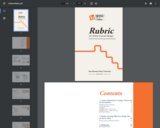
The SHSU Online Course Design Rubric is used to guide and inform the course development process, as well as evaluate the design of any course which contains online components. It can be used whether the course is fully or partially online, flipped or web‐assisted face‐to‐face.
The Rubric was developed by a team of instructional designers and course development practitioners based on nationally recognized, research‐based quality assurance standards related to the essential components of online course design. This includes...
- General course information
- Presentation of course content
- Collaboration & Communication
- Assessment Strategies
- Course Technology
- Learner Support, and
- Accessibility
Not only is the rubric the primary instrument utilized at SHSU for the development and evaluation of online courses, but the tool can also be used as a self‐assessment instrument by instructors as a means to receive constructive feedback on the design of a course, and a means to identify and document effective online course design.
The SHSU Online Course Design Rubric has also been vetted by faculty who are actively involved in online teaching for SHSU. Use of the rubric to inform the development of distance education courses leads to multiple benefits, including...
- Improved student learning
- Ease of navigation of the course environments
- Reduced ambiguity for faculty and students
- More appropriate use of technology
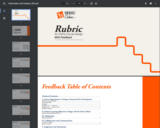
The Rubric for Online Course Design with FEEDBACK is a fillable tool that can be used to evaluate the integration of pedagogy in a fully online course. This tool is a compliment to the SHSU Online Course Design Rubric, also located as Open Source in the OERTX. This tool can be used by various types of reviewers, from instructional designers, to peer faculty reviewers, to program assessment reviewers, or external reviewers.
Also check out the SHSU Online Course Design Rubrics for fully online courses, online-live courses, and hybrid/blended courses.
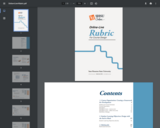
The SHSU Online Course Design Rubric is used to guide and inform the course development process, as well as evaluate the design of any course which contains online components. It can be used whether the course is fully or partially online, flipped or web‐assisted face‐to‐face.
The Rubric was developed by a team of instructional designers and course development practitioners based on nationally recognized, research‐based quality assurance standards related to the essential components of online course design. This includes...
- General course information
- Presentation of course content
- Collaboration & Communication
- Assessment Strategies
- Course Technology
- Learner Support, and
- Accessibility
Not only is the rubric the primary instrument utilized at SHSU for the development and evaluation of online courses, but the tool can also be used as a self‐assessment instrument by instructors as a means to receive constructive feedback on the design of a course, and a means to identify and document effective online course design.
The SHSU Online Course Design Rubric has also been vetted by faculty who are actively involved in online teaching for SHSU. Use of the rubric to inform the development of distance education courses leads to multiple benefits, including...
- Improved student learning
- Ease of navigation of the course environments
- Reduced ambiguity for faculty and students
- More appropriate use of technology
Definition Online Live Course: 100% of instruction (lectures) and course contact hours occurring synchronously (live) online. An online live course is defined at SHSU as an online course with 100% of instruction (lectures) and course contact hours occurring synchronously (live) online. Students enrolled in an online-live course are required to participate in synchronous, online instruction and other course activities in real-time during scheduled class meeting times. Course materials, activities, and instructional assets will be stored in the learning management system.
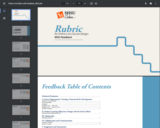
The Rubric for Online-Live Course Design with FEEDBACK is a fillable tool that can be used to evaluate the integration of pedagogy in a fully online course. This tool is a compliment to the SHSU Online Course Design Rubric, also located as Open Source in the OERTX. This tool can be used by various types of reviewers, from instructional designers, to peer faculty reviewers, to program assessment reviewers, or external reviewers.
Also check out the SHSU Online Course Design Rubrics for fully online courses, online-live courses, and hybrid/blended courses.
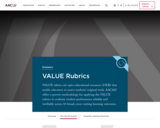
VALUE rubrics are open educational resources (OER) that enable educators to assess students’ original work. AAC&U offers a proven methodology for applying the VALUE rubrics to evaluate student performance reliably and verifiably across 16 broad, cross-cutting learning outcomes.